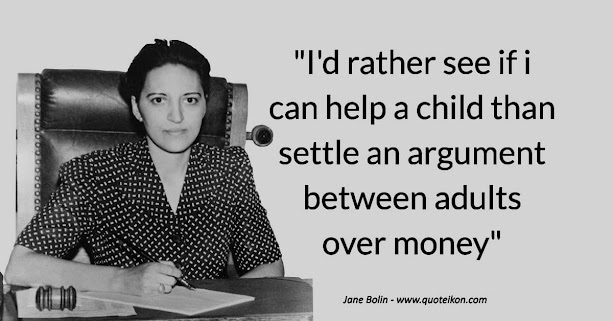Jane Bolin was the first Black woman to attend Yale Law School and became the nation's first female African-American judge.
Born and raised in Poughkeepsie, but with a career in the five boroughs of New York City, Jane Matilda Bolin is best known for a particular “first” of groundbreaking magnitude. She holds the honor of being the first African American judge in the entire United States, joining the bench of New York City’s Domestic Relations Court in 1939. Her appointment by Mayor Fiorello La Guardia, which came as some surprise to Bolin herself — summoned with her husband to an audience with the mayor at the 1939 World’s Fair, she was not informed of the mayor’s intentions in advance — made “news around the world.”
Bolin’s story of legal service and general activism begins at home. Her father, Gaius C. Bolin was the first Black graduate of Williams College and had his own legal practice. Bolin was also the founding member of the local NAACP and later in life became the first Black president of the Dutchess County Barr Association.
Jane Bolin would go on to continue her studies at Wellesley College, the prestigious, private women’s liberal arts college in Massachusetts. She was one of two Black freshmen attending the school. Where racism was so rampant (and they were so ostracized) that they opted to move off-campus. Despite the trials that Bolin faced, she graduated in 1928 as one of the top students and was named a “Wellesley Scholar.”
Even though Wellesley acknowledged her brilliance as a student, when she spoke to a guidance counselor at the school about a possible law career, she was told that “there was little opportunity for women in law and absolutely none for a ‘colored one’”.
Jane Bolin would apply, and then be accepted into Yale Law School, where she would ultimately become the first Black woman to earn her law degree from the esteemed institution. She would later become the first Black woman to join the New York City Bar Association.
After she became a judge in New York City, Bolin served on the Family Court bench for four decades. Bolin devoted herself and her passion for law to advocating specifically for civil service and civil rights, children’s rights, and education. She served on the boards of the NAACP, the Child Welfare League, and the National Urban League.
As a judge, Bolin led the charge (and change) of breaking down racial barriers and segregation within the system she was a part of. She led the charge of requiring childcare agencies that got public funding to accept children regardless of their race or ethnicity. She also ended the practice of assigning probation officers, based on race or religion.
After her retirement in 1979, Bolin worked as a consultant and volunteered as a reading instructor in New York City public school. She also served on the New York State Board of Regents. She died in Long Island City, Queens, New York, on January 8, 2007, at the age of 98.





Comments
Post a Comment